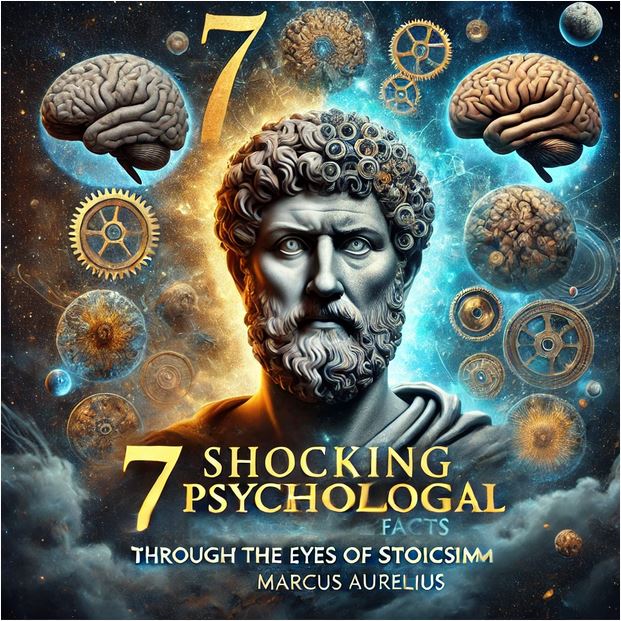Your Cart is Empty
7 Shocking Psychological Facts Through the Eyes of Stoicism
02 Feb, 2025 14

7 Shocking Psychological Facts Through the Eyes of Stoicism | Timeless Wisdom for the Modern Mind
Imagine realizing that almost everything you fear… is an illusion. That your emotions, your anxieties, and even your deepest regrets are merely interpretations—not reality. The ancient Stoics knew this long before psychology ever existed. And today, science confirms it. Here are 7 shocking psychological facts that prove Stoicism was ahead of its time.
The Stoics—like Marcus Aurelius, Seneca, and Epictetus—understood the human mind with striking accuracy. Their philosophy wasn’t just about enduring hardship; it was about mastering your thoughts, emotions, and ultimately… your life. Modern psychology now backs up much of what they taught centuries ago. So let’s dive into these seven psychological facts that reveal the hidden power of Stoicism.
Fact #1: 90% of What You Worry About Never Happens
The brain is wired for survival, not happiness. This means it constantly anticipates threats—many of which never come true. A study from Cornell University found that 85% of our worries never materialize, and for the remaining 15%, most people found they handled the outcomes better than expected.
Stoic Perspective: Seneca famously said, "We suffer more in imagination than in reality." Stoicism teaches us to recognize that most of our fears are self-created. By embracing the present moment and focusing only on what we can control, we free ourselves from unnecessary anxiety.
Fact #2: You Have a Psychological Negativity Bias
Ever notice how one bad comment can ruin your whole day, even if you received a dozen compliments? This is negativity bias—a survival mechanism from our ancestors who had to stay hyper-aware of danger.
Stoic Perspective: Marcus Aurelius wrote, "You have power over your mind—not outside events. Realize this, and you will find strength." The Stoics believed in training the mind to override its natural tendency toward negativity by focusing on virtue and gratitude.
Fact #3: Willpower is a Limited Resource, But Habits Make You Unstoppable
Studies show that willpower depletes over time, much like a muscle. However, once something becomes a habit, it requires little effort to maintain.
Stoic Perspective: Epictetus emphasized discipline and self-mastery, stating, "First say to yourself what you would be; and then do what you have to do." The Stoics practiced daily habits like journaling, reflection, and meditation to strengthen mental resilience.
Fact #4: Your Thoughts Shape Your Reality
Cognitive Behavioral Therapy (CBT), one of the most effective psychological treatments, is based on the idea that our thoughts influence our emotions and behaviors. Change your thoughts, and you change your world.
Stoic Perspective: This aligns perfectly with Stoicism. Epictetus taught, "It’s not what happens to you, but how you react to it that matters." Stoics trained their minds to interpret events rationally rather than emotionally.
Fact #5: The More You Chase Happiness, The Less You Find It
Psychological studies show that those who obsessively pursue happiness often end up feeling more anxious and dissatisfied.
Stoic Perspective: Instead of chasing happiness, the Stoics pursued eudaimonia—a deep, lasting sense of fulfillment that comes from living virtuously. Seneca wrote, "True happiness is… to enjoy the present without anxious dependence upon the future."
Fact #6: The Fear of Death Controls You More Than You Realize
Many psychological studies suggest that our subconscious fear of death influences our decisions, from what we buy to how we vote.
Stoic Perspective: The Stoics tackled this fear head-on. Marcus Aurelius reminded himself daily of mortality with the phrase "Memento Mori"—“Remember you must die.” Accepting death, rather than fearing it, allows us to fully live.
Fact #7: Helping Others Makes You Happier Than Helping Yourself
Studies show that acts of kindness and generosity increase serotonin and dopamine levels, leading to a lasting sense of joy.
Stoic Perspective: The Stoics believed in serving humanity. Marcus Aurelius wrote, "What is not good for the beehive, cannot be good for the bee." By focusing on the well-being of others, we naturally improve our own lives.
Conclusion:
The Stoics weren’t just philosophers—they were psychological pioneers. Their teachings on fear, resilience, happiness, and death align with modern science in ways that continue to shock and inspire. So next time you find yourself lost in worry or negativity, remember: The power to change your mind is already within you.
If this resonated with you, subscribe for more wisdom that stands the test of time. Or check out this next video to deepen your understanding of Stoic psychology.




